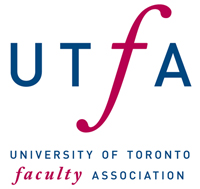Report of the Chair of the Equity Committee, 2021–2022
The Equity Committee advises UTFA Executive and Council on matters pertaining to equity and diversity and assists UTFA in developing policy regarding pay equity, employment equity, sexual harassment, other forms of harassment, personal safety, and accessibility. This year the Committee worked to build on last year’s important work, outlined in the Committee’s revised equity statement released in the fall of 2021—necessitated and informed by the University of Toronto’s stated commitment to address anti-Black racism and to promote Black inclusion.
The Equity Committee has focused on five main issues this year:
- The underrepresentation of Black and Indigenous faculty at the University of Toronto. The Committee continues to seek ways to support attempts by the University to address these issues through various mechanisms, advocacy on recruitment (for both increased hiring of underrepresented groups and cluster hires), hiring practices, working conditions, and retention. The Committee recommends that future rounds of bargaining prioritize these hires and related supports.
- Obtaining data to support UTFA’s ongoing efforts to address salary inequities. To this end, the Equity Committee has been involved in advocacy work related to UTFA’s salary discrimination grievance, led by Terezia Zorić. After several years of litigation, UTFA was successful in securing the right to see data collected by the Administration that sheds light on salary inequities. As set out in the Report of the President, progress has been made to address gender-based salary discrimination for some members, but further work is needed. More work is also needed to address salary inequities among racialized and Indigenous members.
- Offering valuable input to the Barriers to Research Working Group (BRWG) regarding questions of equity and workload related to the pandemic. Since the beginning of the pandemic UTFA members have experienced increased familial and community responsibilities, and these have disproportionality impacted the working lives of women. Racialized and Indigenous faculty have additionally engaged in more affective labour, extra committee work, and providing additional supports to underrepresented students, thus compounding increases to their workloads. This winter, much of my work with the BRWG has been focused on understanding how these shifts affect the ability of equity-seeking faculty to conduct research.
- Critically examining equity-related documents produced by both the U of T Administration and CAUT. Through this work we identified several concerns with the Administration’s Report on Employment Equity 2020. A key concern is the insufficient analysis of the underrepresentation of Black faculty and librarians. To get a better understanding of this issue, we requested disaggregated data. We also discussed the merits and shortcomings of the Scarborough Charter, making recommendations toward implementing its principles. Lastly, we devoted considerable attention to CAUT’s report Indigenization of the Academy to identify how the University can implement its core mandate and UTFA can draw on its recommendations in future bargaining.
- Strengthening UTFA’s governance norms for equitable participation and collegial communication. To this end, the Committee provided feedback on a draft survey to read UTFA Council’s pulse regarding democratic engagement and will work to refine the survey in partnership with the Membership Committee. The Committee also reviewed CAUT’s Anti-Harassment & Non-Discrimination Statement, and a motion that UTFA adopt the principles embodied in the statement was passed by Council. The Committee is currently studying a draft Interim Policy and Procedure for Internal Harassment and Discrimination Complaints and will offer feedback.
As Equity chair, I attended several two-day retreats of the OCUFA Status of Women and Equity Committee (SWEC) in June and September 2021 and February 2022. These sessions provided practical tools and strategies to help participants acknowledge and value difference within their associations, emphasizing the interconnected nature of equity struggles, especially the pandemic’s impact on equity-seeking groups.
Thanks
I am grateful for the valuable counsel, considerable time, and crucial support Equity Committee members have graciously offered in their important work for UTFA. I also give thanks to UTFA’s support staff, especially Kathy Johnson, Helen Nowak and Samantha Olexson for their dependable assistance on all-things equity, and Chris Penn and Marta Horban for administrative assistance. Lastly, I am indebted to President Terezia Zorić for her invaluable input and unfailing moral compass.
I welcome your thoughts on the issues we have worked on, or any other that you would like to see the Equity Committee address.
Kass Banning
Chair, Equity Committee
